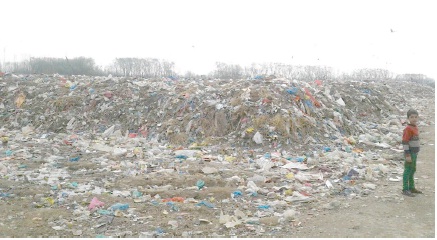SMC violates MSW, EPA guidelines in solid waste disposal
 With the failure of Srinagar Municipal Corporation (SMC) to scientifically manage the solid waste, summer capital Srinagar is facing ‘garbage calamity’ as Achan mess persists.
With the failure of Srinagar Municipal Corporation (SMC) to scientifically manage the solid waste, summer capital Srinagar is facing ‘garbage calamity’ as Achan mess persists.
According to officials, since the acquisition of Achan site (having about 540 Kanals of land) in early 2000, waste disposal at the site was being done as sanitary land filling of the entire untreated incoming mixed garbage that gets generated across Srinagar city. The officials, wishing not to be named informed that the move amounts to an offence under law as the Management and Handling of Municipal Solid Waste (MSW Rules 2000) framed under the Environment (Protection) Act, 1986.permit land filling of only non-biodegradable and inert waste and rejects from waste processing.
The officials told that land filling of mixed waste shall be avoided but SMC is still making no attempt to collect kitchen wastes unmixed with recyclable and other wastes.
“This single step would reduce the volume of Srinagar’s waste by half. Currently the entire mixed waste is collected, transported and disposed untreated without recovery of high volume low weight materials that are occupying 2-3 times more space in the land fill cells that were earlier built by Ramky Infrastructure limited and then by ERA, outsourced by SMC,” they said.
“Leachate generation is another big problem. This is a toxic by product of the untreated garbage, this unmanaged disposal of garbage leads to generation of odor, breeding of flies, mosquitoes and other factors that make life of the people living in the vicinity miserable and irreversibly contaminate the ground water around the leaking landfills,” they said.
While there seems no apparent end to the Achan landfill mess, we learnt that Dr S. R Maley’s methods that were earlier portrayed as a “farce” are practiced globally and seem to be the only end to the ‘garbage calamity’ in Kashmir.
According to environmental experts, the onus was completely upon the Urban Municipal Body of Kashmir who without any scientific advisory has been dumping raw untreated garbage in the garbage dumping cells with a cosmetic soil cover.
“This has serious ecological ramifications which can lead to depletion of flora and fauna of the surrounding areas and ruin all the water bodies close to the garbage dumping site,” noted Solid Waste Management expert Dr S. R Maley told us over phone from Mumbai.
. Dr Maley has been involved in several such projects such as in Navi Mumbai, Siliguri, Kochi and many other places and is associated with MSW projects.
“After noticing my work in different parts of the country, Late Mufti Mohammad Sayeed approached me and asked me to find a way out to the garbage mess in the J&K State and accordingly I visited the State and took stock of the situation,” he said.
Highlighting his work, he said “the method that we employ is very simple to understand and is completely a pro-ecology and pro environment procedure for stabilizing the waste by frequent turnings to minimize formation of leachate and methane,” he said.
“We don’t make use of any chemicals while managing the waste but use plant derivatives which are completely devoid of inflicting any damage to the environment,” he said, adding “At first we had to work on a trial basis for a period of 30 days and show the 30 per cent reduction in the volume of garbage.” He said that there was a “significant decrease” in the quantum of garbage within a short time period, however due to some reasons and time factor the work couldn’t be continued.
Mohammad Tasleem, an engineer and an environmentalist, who works with Dr Maley in the waste management project at Achan said, “Our basic aim at Achan was to reduce the volume of garbage received and prevent leachate formation by four weekly turnings of waste heaps and applying a herbal spray of composting bacteria that speed up the conversion of organic waste to usable manure after screening,” he said. He informed that the inorganic waste that is laden with moisture would be dried up and reduced to a smaller quantity and size and after it gets dry, it could be used as a fuel in cement factories or other places.
“This process is known as bio-stabilization and we make use of bacteria derived from plants and other organic and eco-friendly sources,” he said.
Asked why the process was halted, Tasleem said “We need a mechanical segregator to continue with our work as we are near that stage of the procedure where we need a mechanical segregator which would segregate the innate waste from the compost so that we can continue with the treatment and management of the waste there,” he said.
When asked about the power plant which SMC has proposed to install at Achan landfill site, he said, “It might be a good proposal that could serve Kashmir a lot if they strictly follow the NGT directions dated 20 March 2015 in OA 199 of 2014, which recommends composting as a first option and bans the burning of raw wet waste and of recyclables,” he said. He blamed SMC for the flawed procedures.
“SMC follows flawed procedures, he alleged. He suggested SMC to install a segregator in order to segregate the organic and inorganic wastes in order to go ahead with the proposed power plant.
“The segregator would segregate the organically viable waste that would be turned into organic manure and the inorganic would be made into pellets that would have been an excellent fuel option for the factories in our state,” he said.
Pertinently due to the non-availability of a segregator the work was stopped. “SMC must solve the present waste crisis by immediately collecting wet food wastes and dry recyclables separately, transporting and processing them separately to convert both wet and dry wastes into resources instead of wastes,” noted environmentalist, Almitra Patel told. Patel is also a member of ‘Solid Waste Management’ Committee set by the Supreme Court of India.




